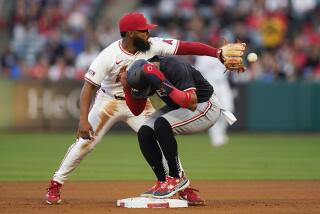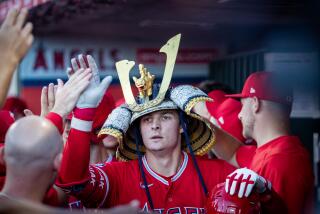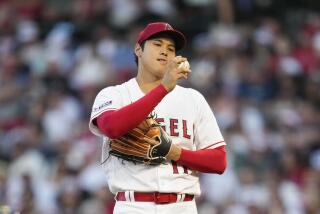Candelaria Makes Impressive Return as Angels Win, 6-1
John Candelaria made it back Wednesday--back from a 47-day stint on the disabled list, back from the personal problems that turned him from baseball player to counseling-center patient, back to the pitching form he displayed before alcohol and depression threatened to end his career at 33.
Making his first start since June 16, Candelaria helped pitch the Angels to perhaps their biggest victory of the season, a 6-1 victory over the Minnesota Twins that pulled the Angels within a half-game of the lead in the American League West.
Candelaria pitched six scoreless innings, limiting the Twins to two singles. He did not allow a runner beyond first base, he did not walk a batter and he struck out seven, including four in a row.
With relief from Greg Minton and DeWayne Buice, Candelaria pitched the Angels closer to first place than they have been since mid-May.
Angel Manager Gene Mauch called it “remarkable” and “wonderful.” The word amazing also filtered through the Angels’ clubhouse.
But Candelaria is not ready to call it a triumphant return or a symbolic conclusion to the emotional struggle he appeared to be losing earlier this year.
“As far as I’m concerned, it’ll never be over,” Candelaria said. “I’m not really dwelling on it. I’m just taking it a day at a time.”
Candelaria knows that whatever else he accomplishes in 1987, this season will be remembered for his two drunk-driving arrests, his two appearances on the disabled list for “personal reasons” and his 28-day stay in a rehabilitation center. He knows the public perceives him as “the Angels’ troubled pitcher.”
So maybe that’s why Candelaria never smiled once during a lengthy postgame session with the press. Maybe that’s why he kept his head bowed and answered questions in a soft voice made hoarse from cigarette smoke--”One of my vices,” he deadpanned.
Candelaria won a game, but was trying to make sure he didn’t lose perspective.
“This is only one game,” he said. “I just hope I can continue to pitch as well as I did today. This is a good team. I don’t think it needs much of a boost. Hopefully, me pitching again can’t hurt.”
Candelaria skirted questions about his life away from the baseball field. “I’m sure people are curious, but I don’t think I need to give an explanation,” he said. “It’s my life.”
Still, he admitted he had to wonder how the Anaheim Stadium crowd (34,059) would receive him when he made those first few steps back to the pitching rubber.
To his surprise, the crowd cheered.
“That was nice,” he said. “It seemed like there was support for me from the people. I didn’t know how the people would react.”
He also didn’t know how he would pitch. Candelaria (6-3) hadn’t won a game since June 5 but was 1-3 between May 8 and his second placement on the disabled list. In his last five starts, Candelaria had an earned-run average of 8.28.
Wednesday, he went out and gave up a leadoff single to Dan Gladden. Then he struck out Greg Gagne. Then he picked off Gladden and struck out Kirby Puckett.
After Gladden’s single, Candelaria retired 16 of 17 batters, allowing only a third-inning single to Gene Larkin. He ended the fourth with another strikeout of Puckett and then struck out the side in the fifth--victimizing Gary Gaetti, Tom Brunansky and Kent Hrbek.
“I didn’t expect to throw that well,” Candelaria admitted. “I think that’s something you can’t expect. I know that before I went on the DL, I wasn’t throwing well.”
With the exception of two simulated games and two bullpen workouts within the past two weeks, Candelaria hadn’t pitched in almost two months.
Yet, Mauch, noting Candelaria’s 10-2 record in 1986 after missing three months due to elbow surgery, said he learned enough from history not to be surprised by Wednesday’s comeback performance.
“John Candelaria is one of the most remarkable talents I’ve ever worked with,” Mauch said. “He can undergo arthroscopic surgery (as Candelaria had in 1986), he can have a long layoff, then he gets in a couple simulated games and comes right back.
“I don’t know what I expected from him. I expected him to be good. I’ve seen him do the same thing before under similar circumstances.”
All the offensive support Candelaria needed was supplied by faces who weren’t in the lineup the last time he pitched. Bill Buckner, beginning his second week as an Angel, hit a three-run home run in the fifth inning. Gus Polidor, the replacement for the injured Dick Schofield at shortstop, drove in two runs with a single and a sacrifice fly.
Mark McLemore’s run-scoring single in the fourth inning accounted for the Angels’ other run.
By the time Candelaria’s return to action was complete, the Angels had taken two of three games from Minnesota, dropping the Twins into a virtual first-place tie with Oakland, just ahead of the Angels. California hasn’t been this close to the top since May 16.
Mauch’s view of the situation?
“The thing that matters to me is that we’re playing well,” Mauch said. “Those innings by Candelaria today and the ones (Kirk) McCaskill gave us Sunday, if that’s an indication of things to come, I’m gonna love it.”
And Candelaria’s view?
“There’s still a long way to go,” he said. “We’ve got a couple of months left. It just feels good to feel like I’m contributing again.”
Angel Notes
As expected, Jerry Reuss was placed on the 15-day disabled list to make room on the roster for John Candelaria. The move really wasn’t news--an Angel publicist inadvertently leaked it a day early by typing Candelaria’s name into the probable pitching matchups for Wednesday--and Candelaria said he “knew about it for a few days.” Reuss’ stint on the disabled list is retroactive to Aug. 1, the day after he left his last start with a pulled left calf muscle. Reuss, 3-1 with a 4.46 ERA in eight starts, will accompany the team on its eight-day trip to Seattle and Minnesota. . . . Angel Manager Gene Mauch was less than impressed with Candelaria’s curveball during his previous workout, but that problem dissipated by Wednesday. “His curveball is what sets all his other pitches up,” Mauch said. “Once he got the curveball under control, the game was over.” Said Candelaria: “I think the breaking ball more or less carried me. I was kind of amazed at the control I had. I thought I’d be wild. I thought I’d give up a couple of runs. This is the last thing I expected.”
Bill Buckner’s three-run home run was a cheap one, barely hooking inside the left-field foul pole. It was his first home run as an Angel and his second since May 31. It also helped beat Minnesota, the team that originally figured to sign Buckner before negotiations broke off when the Twins wouldn’t guarantee him a 1988 contract. “I don’t really know what the final determining factor was,” Mauch said, “but when I talked to him on the phone, I could tell there were other considerations on his mind.” Such as? “Several thousand greens, I don’t know,” Mauch said with a smile. . . . Jack Howell was denied what would have been his 16th home run of the season when Kirby Puckett reached over the center-field fence to rob Howell in the seventh inning. . . . Greg Minton pitched two innings of relief and allowed the Twins’ only run. It came in the eighth, when Tom Brunansky singled, Kent Hrbek doubled and Tim Laudner hit a sacrifice fly. . . . DeWayne Buice pitched the ninth, walking pinch-hitter Randy Bush with one out but getting the final two outs on a double-play grounder by Puckett.
More to Read
Go beyond the scoreboard
Get the latest on L.A.'s teams in the daily Sports Report newsletter.
You may occasionally receive promotional content from the Los Angeles Times.






